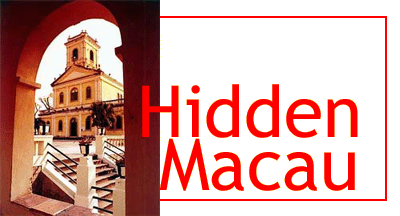 |
 |
 |
|
|||
|
Hidden Macau 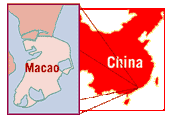
Although Macau's narrow cobblestone streets, pastel stucco buildings and abundance of café con leche remind me more of the Algarve than Asia, when I turn the corner on Tercena alley, I have no doubt the heart of Macau has always been Chinese. Set out right here on the street are about 15 beat up, round plastic tables covered with piles of yellowing Mahjong tiles, each tile painted with delicate red and black Chinese characters. Green bamboo flourishes, wiry, gray haired men in strappy undershirts and flip-flops sit in the nearly 100 degree heat. They're smoking, laughing and slapping the tiles on the tabletops. Some of the players are just in for a hand or two, others settled in for as long as it takes to be a winner.
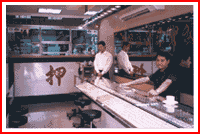
Today Joao Sales is just watching. But the sound of the tiles, like the voices of sirens, seduces even the most well intentioned. This morning, coifed women in flared polyester pants and floral print blouses set their bags down and join in. Frail elderly women in old style padded jackets scramble the piles of ivory tiles as they have seen their parents, grandparents, great grandparents do. Mahjong is centuries old. Its appeal is more ancient, powerful than casinos and slot machines. This is more than gambling. This is about community...but to be a member you must pay your dues. First you sit and watch a couple of years, then you play with the very elderly who are slowed down by age but still sharp enough to abuse a slightly hesitant neophyte
Survive the initiation and then you'll be privy to tall tales, like the one about the elderly man they called the King of Mahjong.
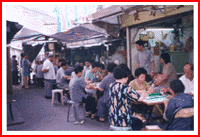
In Tercena alley, stakes are about as high as in a suburban Saturday night poker game. Not so in Macau's high roller casinos. Forget your lucky undies and you're likely to end up at one of Macau's dozens of pawnshops. Twenty-four hours a day, red neon bat wings, the pawnshop symbol, blink over doorway after doorway along the streets around the casinos. Inside Sa Dao pawnshop, thick glass cases display rows of glittery watches, rings and gold chains thick enough for the pharaohs of Las Vegas. At the back of the store, Mr. Tsang Yuan Tong, the owner, looks out from behind bulletproof glass. Like a bank teller he negotiates with clients through a sliding window. One fellow, sweating in shirtsleeves, standing on tiptoe to see over the counter, is pawning a jade ring. He doesn't want cash. "Cut to the chase", he says. "Give me casino chips." "Not available", says Mr. Tsang without blinking. He's been in the pawnshop business for a quarter of a century and has seen it all. 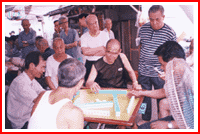
Since the hand-over, business is up. Newly rich mainland Chinese are coming over to gamble and if their luck isn't top notch, their taste in the jewelry they've left behind is. Mr. Tsang, his own fingers sparkling with rings, opens drawer after drawer of treasures. He's showing me a pair of Rolexes worth $45,000. Another drawer is filled with diamond rings, jade, ruby necklaces. Every gorgeous piece is a steal for the sharp shopper, a tale of bad luck for the former wearer. And what about that streak of bad luck? Will it ever change? In Macau, there are many ways to find out. Fortunetellers abound in little shops, by appointment in upscale office towers, and places like this one: a little table on the street. The fortuneteller reads not only my palm. 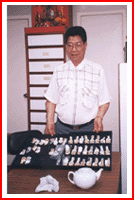
Don't like one fortune? Try another. Inside this 400 year old temple of Kun Iam, past the draping Banyan trees, past two good luck lions, and under a Ming dynasty porcelain frieze covered with good luck, dragons and fish is a small glass counter where visitors can check their luck. For a small fee you can find your fortune by rattling a wooden cylinder of bamboo slivers, like ancient pick up sticks. When a single stick falls out, the tiny Chinese character painted on it is read by a sweaty, tired temple attendant.
As if to confirm my rosy fortune, fireworks explode just outside the temple doors. I'll take that as a sign my luck is on the upswing. In Macau, I'm Judith Ritter for The Savvy Traveler.
|
 | American Public Media Home | Search | How to Listen ©2004 American Public Media | Terms of Use | Privacy Policy |
